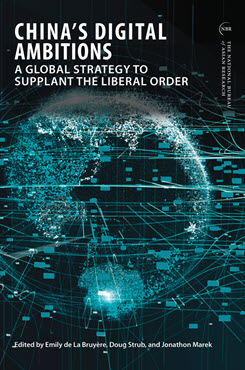Writing the Rules
Redefining Norms of Global Digital Governance
This chapter examines China’s increasingly assertive efforts to influence international data governance, especially cross-border data flows, and promote its concept of “cyber sovereignty,” while also analyzing its restrictive approach to domestic data governance as the basis for its international advocacy efforts.
EXECUTIVE SUMMARY
MAIN ARGUMENT
In recent years, China has clearly and forcibly advocated in the international sphere for “cyber sovereignty” and a state-centric approach to international data governance, including through proposals such as its Global Initiative on Data Security. The principles of state and cyber sovereignty emphasize that governments can essentially take whatever actions they deem necessary with respect to data, including leveraging it for economic development and national security. Beijing’s strategy for influencing international data governance includes an expansive digital agenda at the United Nations, selective attempts to influence data discussions at the G-20, and government and private-sector engagement in standard- setting organizations and other countries’ domestic digital governance policies. China’s approach to digital trade provisions and agreements in the Asia-Pacific and at the World Trade Organization is also evolving. Its success will depend in no small part on how well the United States and other liberal democracies respond to these efforts.
POLICY IMPLICATIONS
- Data governance, especially the restriction and control of data flows, is central to China’s international advocacy for a state-controlled internet. The U.S. and other liberal democracies need to develop a detailed, whole-of-government global digital strategy to counter China’s efforts.
- The contest over the flow of data is critical for shaping the future of the internet. The outcome will impact success in today’s data-driven economy, which increasingly depends on how effectively firms can leverage data to generate insights and unlock value.
- There are few international binding rules and agreements governing how organizations collect, use, protect, store, and share data, or regarding what happens when data is transferred across borders. This is also true for related issues like cybersecurity, cybercrime, and digital development. This provides China room to expand its leadership in global digital governance if the U.S. and others do not develop better, alternative approaches to addressing these issues.
Nigel Cory is an Associate Director at the Information Technology and Innovation Foundation, where he focuses on cross-border data flows, data governance, intellectual property, and how they each relate to digital trade and the broader digital economy. He previously worked for eight years in Australia’s Department of Foreign Affairs and Trade.



 Identifying and Countering China’s Global Digital Strategy (Paris)
Identifying and Countering China’s Global Digital Strategy (Paris)

